
We have all heard countless times where people say they would be a true believer if only they saw a miracle happen right here, right now. Judaism celebrates miracles that took place thousands of years ago. Why don’t we see open miracles in our time as well? We are about to celebrate the plagues and the parting of the sea that took place during the time of Passover. That was one of the greatest miracles of them all. We mention Yetziat Mitzrayim every day in our prayers and at every major holiday. Yet, witnessing an outright miracle may not have that extraordinary effect that we might imagine.
When the new Jewish nation left Egypt, numerous open miracles occurred. The 10 plagues affected the Egyptians but the Jews were spared. The Egyptians loaded the Jews with all of their jewelry and gold. The sea split and let the Jewish people through while drowning the pursuing mighty Egyptian army. Shortly thereafter, Hashem presented the Jewish people with the Torah on Mount Sinai amidst thunder and lightning (Shemot 19:16). These open miracles should have impressed every living soul who witnessed it. Yet, within a couple of months, when Moshe was merely a day late in returning off the mountain, the Jews who had witnessed all of these miracles turned and worshiped a golden calf. It seemed that the effect had worn off in a such a short time.
The last surviving prophet of the time, Elijah, lived in an era when many Jewish people worshiped Baal, an idol whose religious doctrine encouraged people to yield to every perverse whim and fetish they wished to indulge in. We read the story (I Kings 18:1-39) of how Elijah challenged 450 priests of Baal to a showdown. They offered a sacrifice and prayed all day, fasting and flagellating themselves to no avail. Their god, Baal, did not answer. Finally, Elijah poured buckets of water onto the firewood and offered up a sacrifice to Hashem. Immediately, a heavenly fire descended and consumed the sacrifice, proving that Hashem was the true God. The Jewish people were so impressed by this open miracle that they fell on their faces and cried out, “Hashem, He is the true God.” (We even repeat this seven times at the conclusion of the Yom Kippur services.) The priests of Baal were all slain and the people saw the skies open up when torrents of rain fell and broke the long drought.
Although the haftarah stops at that point, the sequel to the story is amazing. You would have thought that Elijah had it made and that he was now the hero. Instead, we read that the next day, Elijah fled for his life and hid from Queen Jezebel in a cave. Despite having witnessed God’s open miracle the day before, he became despondent and prayed to die. He literally said, “I’ve had enough. Just kill me now.” (I Kings 19: 4)
These two stories illustrate that witnessing open miracles may not be sufficient. The new Jewish nation, having witnessed miracles, went on to worship an idol. Elijah, having witnessed a great miracle, nevertheless became despondent and lost hope. He had to be reminded by Hashem that it is not in the strong winds, earthquakes and fire that we experience faith. Sometimes it is in the small, simple voice inside of us that we experience godliness.
Psychology employs a technique called “mindfulness,” where we are encouraged to focus one’s awareness on the present moment while calmly acknowledging and accepting one’s feelings, thoughts and bodily sensations. When we focus on the present moment we become aware of all the small miracles that surround us at every moment. In fact, as observant Jews we pray the Modim prayer three times a day. We state, “We are grateful for your miracles that are with us every day and for all the wonders and favors at all times, morning, noon and night.”
R’ Eliezer in the gemara (Niddah) reminds us that sometimes we are the recipients of small miracles we are not even aware of. For example, we may get delayed and miss a ship or an airplane, only to hear later that it had gone down. We take our health for granted until one small problem appears and everything slows down or stops.
As we celebrate this holiday of miracles, we need to remember that our faith in Hashem is not based in seeing open miracles. Even those who see such miracles may not be convinced. Instead, we have to be focused on what is happening around us at the present moment and be mindful of the small miracles that surround us constantly. We cannot take anything for granted. May Hashem grant us the wisdom to appreciate the miracles that envelop our lives, both big and small.
By Rabbi Dr. Avi Kuperberg
Rabbi Dr. Avi Kuperberg is a forensic clinical psychologist in private practice. He is president of the Chai Riders Motorcycle Club of NY/NJ. He leads the Summit Avenue Shabbos Gemara shiur and minyan in Fair Lawn, NJ, and is a member of the International Rabbinical Society. He can be reached at Psychologist@Juno.Com.










